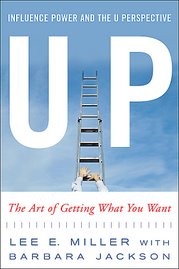
I remember the exact moment when, in our work together, my daughter Jessica stopped being my daughter and became my co-author.
It had been her idea for me to write "A Woman's Guide to Successful Negotiating: How to Convince, Collaborate and Create Your Way to Agreement." Her idea was to have a negotiating book written from both a male and a female perspective, although Jessica never suggested she be the one to write it with me.
Naturally, though, I turned to her to be my co-author, not only because she is a gifted negotiator and a successful businesswoman, but also because, after all, the book was her idea.
We agreed to each draft certain chapters and then critique each other's work. The way this was supposed to work was that we would discuss the proposed changes until we were both satisfied with the result. Initially this process did not go well because, whenever we disagreed, I reverted to the "father role" and exerted my "right" to have the final say.
She called me about a week after I sent her the first draft of a chapter titled "Negotiating with Your Spouse or Boyfriend." Her response was both unequivocal and totally unexpected. She said, "Dad, you are a genius when it comes to business negotiations but you really do not have a clue when it comes to relationships. Let me take a crack at writing the first draft for this chapter."
A few weeks later, when I received her draft, it was completely different from what I had written and, frankly, much better. From that point forward, whenever we disagreed, I took her views much more seriously.
Working with your children can be rewarding for everyone involved, but it also can be difficult. Vinnie Brand, the owner of the Stress Factory Comedy Club in New Brunswick has had all three of his children work with him at one time or another. He warns sometimes a child who works in a family business brings with them a sense of entitlement. They come in late, they do not do their job and generally act as if they can do whatever they want because they are the owner's son or daughter. That attitude can really hurt a business because the other employees quickly come to resent it.
Peter and Mathew Glazier are a father and son team that runs the Glazier Group, a company that owns and operates a chain of upscale restaurants, including the Strip House in Livingston. Before Peter allowed his son to join the family business, he insisted Mathew "spend some time working elsewhere." That way he "would be able to make an intelligent decision about his future."
Mathew, who became a lawyer and practiced law for several years before joining his father, agrees with his dad's advice: "Working outside the family business allows children to see how things are done elsewhere and enables them to come into the business with some real world experience that can add value to the company."
Everyone I spoke with on this topic, though, seems to agree the secret to parents and children successfully working together ultimately boils down to mutual respect. It is important for children to respect that their father or mother created a successful business using methods that worked, even if they are not currently considered the best practices. For the same reason, parents have to accept that things will change when their children join the company.
Even when you come to respect your children as business colleagues and deal with them as equals, they never stop being your children. Although my daughter is an exceptional negotiator, I do not think it was her extraordinary negotiating ability that enabled her to persuade me to give her 75 percent of the book advance.
She simply reminded me she had just started a new job in a new city and she needed the money for her new house -- a negotiating tactic that would only work for a business colleague that happened to be your father.
A veteran human resources executive, Lee E. Miller is the author of "UP: Influence Power and the U Perspective -- The Art of Getting What You Want," and the co-founder of YourCareerDoctors.com, a Web site devoted to career success. Mail questions to Lee@YourCareerDoctors.com.


No comments:
Post a Comment